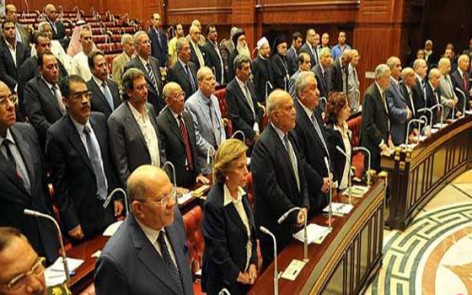 The Cairo Institute for Human Rights Studies has profound reservations about the constitution drafted by the fifty-member committee tasked with amending the 2012 constitution. While the provisions and language in the amended chapter on rights and liberties are preferable to those in the 2012 document, and the new version explicitly acknowledges that rights and liberties enshrined in international conventions ratified by Egypt binding on the state, the 2013 draft constitution does not provide for a political system that will guarantee and protect the rights and liberties it ostensibly recognizes from violations through legislation and attacks by the security apparatus, both of which have occurred and have continued to occur in flagrant violation of a draft constitution whose ink has barely dried. Moreover, the draft constitution allows for the legal restriction and diminishment of the human rights it upholds by leaving the interpretation of several of its articles to statutory law. In addition, the latest revision preserves several problematic articles from the now suspended 2012 constitution, including one legalizing military trials for civilians.
The Cairo Institute for Human Rights Studies has profound reservations about the constitution drafted by the fifty-member committee tasked with amending the 2012 constitution. While the provisions and language in the amended chapter on rights and liberties are preferable to those in the 2012 document, and the new version explicitly acknowledges that rights and liberties enshrined in international conventions ratified by Egypt binding on the state, the 2013 draft constitution does not provide for a political system that will guarantee and protect the rights and liberties it ostensibly recognizes from violations through legislation and attacks by the security apparatus, both of which have occurred and have continued to occur in flagrant violation of a draft constitution whose ink has barely dried. Moreover, the draft constitution allows for the legal restriction and diminishment of the human rights it upholds by leaving the interpretation of several of its articles to statutory law. In addition, the latest revision preserves several problematic articles from the now suspended 2012 constitution, including one legalizing military trials for civilians.
CIHRS unequivocally rejects Article 204, drawn from the 2012 constitution, which rejects the demands of the long, hard-fought campaign against these unfair trials, to which thousands of Egyptians have been subjected. The changes to the article are merely cosmetic, ensuring the continued prosecution of civilians in military courts that fail to meet the most basic standards of independence and fairness. CIHRS is also troubled by Article 201, which precludes the possibility of a civilian defense minister by specifying that the minister must be chosen from the members of the armed forces officers. Article 234, which will be in effect for two full presidential terms, also makes the appointment of the defense minister dependent on the approval of the Supreme Council of the Armed Forces. This provision upends civilian-military relations and makes the military establishment equal and parallel to the elected civilian authority.
The fifty-member committee met the demands of state institutions in the constitution, to the exclusion of all other stakeholders. This has produced a constitution that allows major state apparatuses virtually autonomy, thus threatening state sovereignty and stability and the complementary roles that state institutions should play. This is most clear in provisions related to the military and judicial establishments.
Under the new constitution, the Supreme Constitutional Court has the authority to select its own members with no oversight. The fifty-member committee did not specify any criteria for the selection and appointment of judges. The committee also included a provision requiring a two-thirds majority in parliament to amend laws related to judicial bodies, while remaining silent on rules to hold judges accountable if they harm justice and citizens’ rights.
The clauses on Egyptian identity in the 2012 constitution, included largely thanks to the efforts of Islamist parties, especially the Salafi Nour Party, have not been removed from the revised draft constitution. This weakens the chapter on rights and liberties, allowing the ruling authority to infringe liberties and democracy in the name of a particular understanding of Islam. It is not insignificant that the constitutional declaration issued after the removal of President Mohamed Morsi made the 2012 constitution the starting point for the fifty-member committee’s work; as a result, several of the inroads made by undemocratic, religious political forces that are hostile to the foundations of the human rights system are preserved in this version.
Article 7, which states that al-Azhar is “the principal reference for the religious sciences and Islamic affairs,” preserves the legislative influence first granted to al-Azhar by the Muslim Brotherhood constitution of 2012, which specified that al-Azhar’s senior scholars should be consulted on all matters related to Islamic law. Though changed, the revised article still allows for possible interference by al-Azhar in the legislative process, placing it above the elected parliament and granting it a privileged place in political life as the principal authority on Islamic affairs.
Additionally, article 3 states that the religious principles and laws of Christians and Jews are to be the primary source for legislation regulating matters of personal status, religious affairs, and the selection of spiritual leaders in their respective communities. This article ignores the existence of other religious minorities and communities in Egypt while also establishing multiple, parallel legal systems, a sharp departure from the norm for modern nation-states. The article moreover restricts Christian citizens’ right to marry and divorce, making them subject to canon law and church decrees. This subject matter was initially included in the constitution by religiously motivated political forces that believe in neither the modern democratic state nor human rights. Now, these clauses have been retained by ostensibly democratic forces that rushed to defend human rights when confronted by the 2012 constitution, in order to placate the Orthodox Church.
Article 74 prohibits the establishment of political parties based on religion or any anti-democratic principles, but the committee did not resolve the contradiction of how to ban such parties in light of Article 2. If a group of citizens founds a party that aims to enforce Article 2 and apply a particular understanding of Islamic law, by what logic could the party be prohibited? Will al-Azhar be consulted for an opinion in its capacity as a religious institution? And how will practices be identified and categorized as anti-democratic, thus necessitating a party ban?
The committee removed the problematic provision proposed by the Salafis that was included in the 2012 constitution, referring to the role of the state and society in preserving the traditions and values of the Egyptian family, but the text that remains is still vague and overly florid. How can the state take care to uphold the cohesion and stability of the family and promote its values without defining these values? Moreover, inscribing a ‘duty to promote’ in the constitution, as opposed to specifying rights, may be used by legislators to restrict rights and liberties.
While Article 53 upholds full equality between citizens, criminalizes discrimination and incitement to hatred, and establishes an independent commission to eliminate all forms of discrimination, Article 64 engages in discrimination by referring to Abrahamic religions alone relative to the establishment of houses of worship. This is yet another failure to protect citizens’ basic rights and inscribes discrimination in the constitution itself.
The committee drafted Article 67 from scratch, which states, “No legal action can be taken to suspend or confiscate artistic, literary, or intellectual works or against the creators thereof except by the Public Prosecution. No liberty-depriving penalties shall be levied on crimes committed resulting from the public nature of an artistic, literary, or intellectual product. For crimes related to incitement to violence, discrimination between citizens, or character defamation, the law shall specify the penalty.” While this article can be read as a well-intentioned attempt to protect writers and artists from hisba suits—lawsuits filed by third-party citizens seeking the enforcement of moral or religious norms—it also establishes an excessive government oversight of thought and opinion and would open the door for future unnecessaryintellectual disputes in courts of law. In addition, the vagueness of the article permits liberty-depriving penalties to be employed in opinion cases on the grounds of discrimination or incitement to violence. The latter part of Article 67 is repeated in Article 71, which permits press censorship in times of war or public mobilization, preserving the archaic and misguided notion that limits on publications are justified in exceptional times.
Article 76 does not permit the establishment of trade unions by notice, as is the case with NGOs, while Article 77 follows the 2012 constitution in standing against union pluralism, allowing only one trade union per profession.
Article 86 states, “The preservation of national security is a duty, an obligation for all, and a patriotic responsibility.” “National security” is left undefined, such that the article’s effect is to compel all citizens to preserve the sanctity of a vaguely worded concept. Moreover, protecting national security should be the task of the security establishment. National security is invoked elsewhere in the constitution. Article 31 states, “The internet is part of the economic and national security system, and the state is obligated to take measures necessary to preserve it, as regulated by law.” This wording will allow legislators and the security apparatus to harass or prosecute bloggers and citizens who express opinions online and in social media that the authorities find troubling. The constitution also provides for the creation of a supreme media council in Article 211, tasked with ensuring that national security standards are binding on press and media institutions As such, the council’s decrees may well become the chief means by which press and media freedoms are suppressed in the name of protecting national security.
Article 237 in the chapter on transitional provisions establishes the basis for a new counterterrorism law, stating that the law will provide for fair compensation for harm arising from terrorism. It does not, however, obligate the state to pay compensation for harm arising from security practices and the violation of human rights and basic liberties during counterterrorism campaigns.
Human rights have not been a priority for any of the governments formed since January 25, 2011. In just a few days, Egypt will celebrate the three-year anniversary of the January uprising. In this period, various political coalitions have governed the country, but it is clear that for most parties and political forces, whether liberal, Islamist, leftist, or nationalist, support for human rights and full citizenship rights—even the right to life—is not a matter of ideology, political tenets, or the values these forces ostensibly uphold, but instead is more dependent on who is in power. The distance from or proximity to power is in fact the strongest political determinant of parties’ support for human rights. This suggests that many political actors in Egypt view human rights as a political stick with which to beat governments they oppose, and that they are quite willing to abandon support for human rights as soon as they succeed in stripping their political opponents of influence or themselves reaching the seat of power. If this attitude becomes entrenched in Egyptian political life, human rights and the democratic transition will be the ultimate losers.
CIHRS is extremely concerned by the failure of two attempts in one year to draft a non-theocratic, democratic constitution that provides the necessary guarantees for rights and liberties, in conformity with international human rights standards, and lives up to the sacrifices made by the Egyptian people before and after the January 25 uprising.
Below is a detailed commentary that CIHRS sent to the committee of ten mandated by the interim president in July 2013 to provide a preliminary review of the 2012 Constitution.
Share this Post

